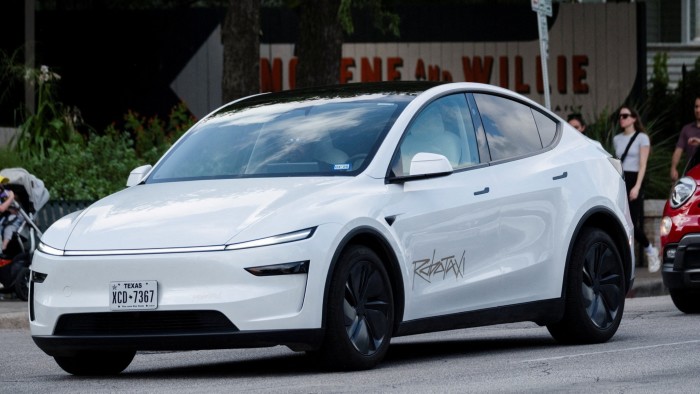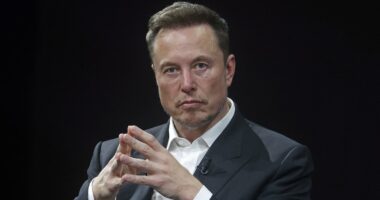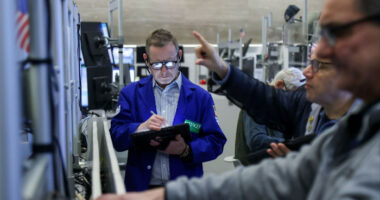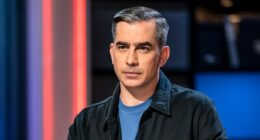Share this @internewscast.com
Unlock the Editor’s Digest for free
Tesla has issued a caution regarding additional revenue setbacks due to Donald Trump’s trade war and anti-electric vehicle initiatives in the US president’s “big, beautiful bill,” further dimming the forecast as second-quarter profits fell by 23 percent.
Trump’s prominent fiscal policy jeopardizes a vital profit stream for Tesla, which had enabled the electric-vehicle manufacturer to sell billions of dollars in regulatory credits to more polluting competitors to compensate for their emissions.
The impact on Tesla from these presidential policies — including the removal of incentives for electric vehicles and solar power — has intensified the conflict between CEO Elon Musk and Trump, drawing the world’s wealthiest individual back into the political arena despite his vow to investors to concentrate his efforts on the electric-car company.
“We are in the transition period where we will lose a lot of incentives in the US,” Musk said. “We probably could have a few rough quarters.”
Tesla shares fell more than 4 per cent in after-market trading on Wednesday following Musk’s comments, and have dropped 30 per cent from a peak in mid-December.
The billionaire’s close relationship with Trump, after supporting his re-election bid, was initially interpreted as beneficial to Tesla. However, Musk’s role at the so-called Department of Government Efficiency (Doge) alienated some customers as he celebrated brutal cuts to the federal workforce.
He left the White House in May after falling out with the president, becoming a fierce critic of the Republican’s spending bill and pledging to launch his own political party.
Consumer backlash against Musk’s political activities has contributed to a sales slump at Tesla, which is also suffering from an ageing model line-up and greater EV competition from Chinese and western rivals.
The Austin, Texas-based company on Wednesday reported that its adjusted net income came in close to analysts’ expectations at $1.4bn for the three months through June, down more than a fifth from $1.8bn a year earlier.
The carmaker warned Trump’s policies would add to its difficulties in the coming months.
Chief financial officer Vaibhav Taneja said Tesla had a limited supply of vehicles and might not be able to deliver enough cars in time to meet orders if consumers rushed to beat the September deadline for the end of the $7,500 federal tax credit for EV purchases and leases.
Tesla stands to lose much of the income from the sale of its regulatory credits after Trump’s bill eliminated fines for non-compliance, throwing the future of emissions trading programmes in doubt. Revenue from the credits almost halved to $439mn in the quarter from a year before. Last year, the company made $2.8bn from these sales.
The bill also threatens Tesla’s other business lines by removing a range of incentives for renewable energy.
Taneja said Tesla faced $300mn in additional tariff-related costs in the second quarter and warned this figure would increase through the year. The US has imposed higher tariffs on foreign-sourced cars and components, including battery cells that Tesla imports from China.
“While we are doing our best to manage these impacts, we are in an unpredictable environment on the tariff front,” he added.
In a bid to revive its sales momentum, the company said it would aim to begin mass production of its delayed affordable model during the second half of the year.
Tesla’s revenue fell 12 per cent to $22.5bn in the second quarter from a year earlier, close to the average $22.7bn analyst estimate, according to data from Visible Alpha. Its operating margin dropped to 4.1 per cent, from 6.3 per cent. Reported net income declined 16 per cent to $1.2bn.
With the slide in its automotive revenue, Musk has tried to convince investors that the company’s future lies in the growth of its self-driving robotaxi service, which launched in Austin last month.
Musk said the number of robotaxis in operation would increase at “a hyper-exponential rate”, making the ride-hailing service available to half of the US population by the end of the year, pending regulatory approval.
He also predicted that Tesla would be producing 100,000 of its Optimus AI-powered robots within five years.
Despite the release of an upgraded version of its flagship Model Y sport utility vehicle, Tesla’s sales have continued to sag in big European markets.
Musk said he expected sales to improve in Europe if and when Tesla gets regulatory approval for its “full self-driving” technology, which he said could happen this year.
Earlier this month Tesla disclosed that it sold 384,122 vehicles in the quarter, below the 389,000 forecast by analysts and down 13 per cent from 443,956 in the same period last year.
Barclays analyst Dan Levy said the result was “positive, with improved fundamentals and narrative intact”.
But he added “the volume outlook remains uncertain” and Tesla did not give a forecast for the number of cars it would build, as investors had expected. Tesla scrapped its guidance in April, blaming economic uncertainty from tariffs.











